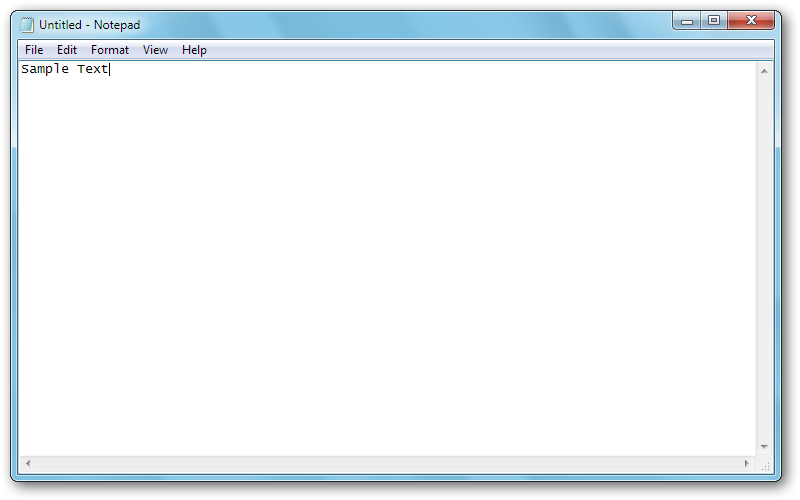
- NOTEPAD TEXT EDITOR FOR MAC
- NOTEPAD TEXT EDITOR CODE
- NOTEPAD TEXT EDITOR FREE
- NOTEPAD TEXT EDITOR WINDOWS
NOTEPAD TEXT EDITOR CODE
It comes with all the features you would expect from a powerful code editor and then some more. Sublime Text is a cross-platform code editor for Mac, Windows, and Linux. Moreover, it comes with syntax highlighting, autocomplete, visual debugger, workflow management, and live preview options. It also offers powerful tools for developers to collaborate and work together. It lets you work on multiple popular programming languages, including PHP, Python, Perl, Ruby, Node.js, Javascript, and more.
NOTEPAD TEXT EDITOR FREE
Komodo IDE is a free and fast code editor for Mac, Windows, and Linux users. It also comes with a built-in FTP plugin that allows you to connect to your server and edit files directly without leaving the editor. It comes with syntax highlighting for many languages including PHP, JavaScript, HTML, and CSS. It is easy to use for beginners and highly powerful for advanced users. Notepad++ is a free and open-source code editor for Windows.
NOTEPAD TEXT EDITOR FOR MAC
Without further delay, let’s take a look at some of the best code editors for Mac and Windows.
NOTEPAD TEXT EDITOR WINDOWS
In this article, we will show you some of the best code editors available for Mac and Windows users. However, there are better code editors out there with features like syntax highlighting, advanced find and replace option, FTP integration, and more. Well, you can use any plain text editor such as NotePad. Just don't ask it to format it for you.Are you looking for the best code editors to edit WordPress theme files? Open a new a Notepad window and you'll notice the cursor blinking, beckoning you to type something, anything. Notepad has a slightly different and cleaner look now, but it's still entirely recognizable as the app I know and love - a simple piece of programming that will load instantly, keep track of my notes, live in folders or the desktop, and ask basically nothing of me. It's overhauled all the windows, app icons, and even File Manager. Microsoft has done a lot in Windows 11 to refresh the aging OS, including shifting the start menu and taskbar to the middle.

Notepad is a simpler app from a simpler time, which is probably why I'm so glad it's still part of the ever-changing Windows platform. I mean, look at the app icon, it's a notepad, not a computer screen. I still prefer the light mode, which I think better reflects the notepad theme. There's also a dark theme setting, which is like a throwback to the original DOS interface, and CRT-screen programming platforms. Who needs all Bold or italic Notepad files? I do think the size control is nice for those who are struggling to read their text files on our high-resolution desktops. If you do choose something other than the default, you can set the style to something besides regular. The default is Lucida Console (of course it's "console") but you can choose from among dozens of different system fonts. Under a new settings icon (it looks like a gear) you'll find the option to set your type font. Notepad in Windows 11 has changed a bit but not in any way that makes the app less useful. The other benefit of this clean approach is that text files can be incredibly small (light on bytes). I do not need formatting in a text editor. Key features like "Word wrap" (without it text just continues off to the right) persist, as do its limitations, like the lack of auto-save, and almost any kind of formatting. Where we once had "File," "Edit," "Search," and "Help," we now have "File," "Edit," "View" Notepad is an incredibly comforting Windows 11 app because it has changed so little since its Windows 95 version. Even so, I believe the good far outweighs the bad for this native Windows app. Or what about the people who put all their passwords in a Notepad desktop file? They might as well write their passwords down on a piece of paper and leave them on their front porch. My desktop is littered with these castaways. That strong resemblance to actual notebooks has led to some abuse, like opening a Notepad file, taking notes, and then forgetting about it.

I know there are other ways to do this, but the Notepad scrub is still the fastest way. When I cut and paste links, really text from any other platform or website, I often drop it into Notepad - where it is essentially stripped of all links and formatting - and then copy and paste from there to place it in another platform. Notepad also serves its longtime function of format-scrubbing. If I have a system file or bit of programming and want to see the code, Notepad has the best chance of opening it and letting me see inside.


 0 kommentar(er)
0 kommentar(er)
